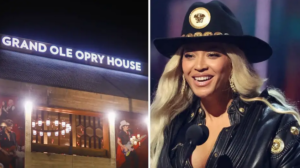
The Grand Ole Opry, Nashville’s iconic venue for traditional country music, has stirred controversy by announcing a lifetime ban on global music icon Beyoncé. The decision, rooted in Beyoncé’s crossover into country music with her song “Daddy Lessons,” has ignited debates over the genre’s boundaries and representation.
Established in 1925, the Opry has celebrated country music’s heritage, hosting legends like Johnny Cash and Dolly Parton. However, Beyoncé’s ban marks a departure from this tradition, drawing both support and criticism from fans, artists, and industry insiders.
Supporters argue that the Opry must uphold country music’s integrity and authenticity, viewing Beyoncé’s crossover as a dilution of its traditional roots. Critics, on the other hand, see the ban as exclusionary, limiting the genre’s evolution and diversity.
Beyoncé’s representatives have expressed disappointment, emphasizing the importance of embracing diversity in music. They highlight Beyoncé’s contributions as a celebration of country music’s rich heritage and universal appeal.
The controversy also highlights country music’s ongoing challenges with diversity and representation. Artists like Lil Nas X, Mickey Guyton, and Kane Brown have expanded the genre’s reach, challenging stereotypes and fostering inclusivity.
As discussions continue, the Opry’s decision prompts reflection on how country music defines itself in an evolving musical landscape. The controversy underscores the need for greater inclusivity, encouraging a broader view of what country music can be in the future.